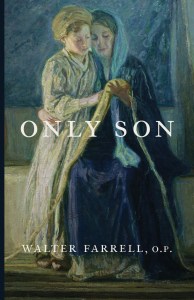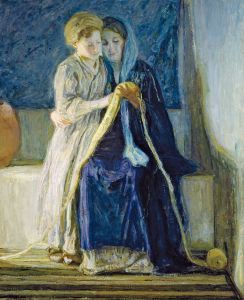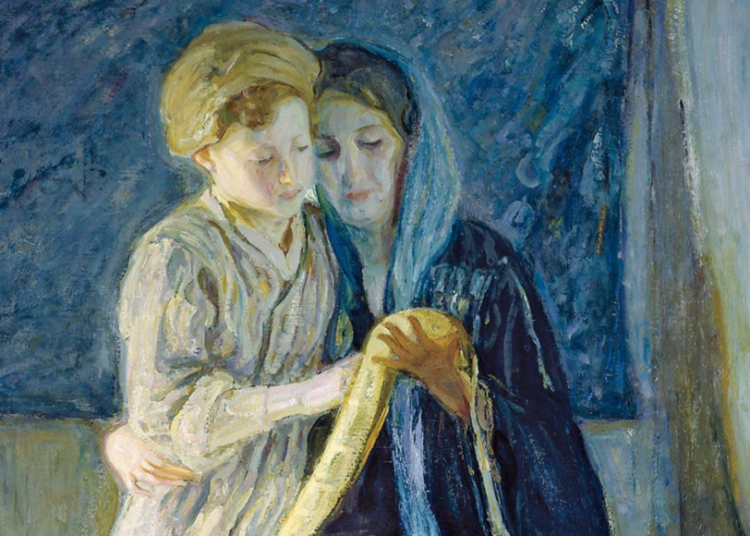The kingdom of heaven would not appear before the eyes of men with a crash of thunder and a blaze of lightning. It would begin, in itself and in each man’s heart, humbly, almost insignificantly, as small as the mustard seed.
Only Son, by Walter Farrell, O.P. (226 pages, Cluny Media)
 “And His mother and His brethren came; and standing without, sent unto Him, calling Him. And the multitude sat about Him; and they said to Him: Behold thy mother and thy brethren without seek for Thee.” The answer of Christ held nothing of displeasure, no hint of reproach for this affectionate family concern; rather in full appreciation of this family love, Christ invited all men to share an even deeper, more intimate, more steadfastly loyal family bond. “And answering them, He said: Who is my mother and my brethren? And looking round about on them who sat about Him, He saith: Behold my mother and my brethren. For whosoever shall do the will of God, he is my brother, and my sister, and my mother.” “The same day Jesus going out of the house, sat by the seaside” (Matt. 13:1). “…and a great multitude was gathered together unto Him, so that He went up into a ship, and sat in the sea; and all the multitude was upon the land by the seaside. And He taught them many things in parables” (Mark 4:1–2). St. Matthew here records eight of these parables couched in words of such simple beauty and dignity as to make it difficult to tear our eyes away from them; yet we miss the greater beauty, and the strong tenderness that brought forth the beauty, if we do not see the circumstances that framed these masterpieces. The Sermon on the Mount was sharply clear, forcing the mind to decisive acceptance or rejection; the parables, on the contrary, have their full beauty veiled, their meaning is to be ferreted out by the mind, caught up by the clues given, the familiarity of the material, and the implicit promises of treasures hidden in the figurative speech. The obscurity was deliberate; but it was by no means a petty mind’s instrument of niggardliness or the tantalizing patronage of a proudly superior mind. The very obscurity was a statement, in fact, of the patient concern of Christ for the least of men, an example of the most difficult of all the varieties of patience, that intellectual patience which slows the steps of wisdom’s words to the pace of a stumbling mind. The Sermon on the Mount developed the theme that had been familiar to men through all the rabbinical teaching: that righteousness is demanded of man for his salvation, that God is first in mind and heart, that love goes out beyond the furthest reaches of justice. Men would have no difficulty receiving such teaching however great their reluctance in living it. The doctrine of the parables had no such easy sailing; before it could receive a welcome from these men, an old, deeply cherished, fiercely held illusion had to be cleared from the mind of men. The parables spoke of the kingdom of heaven, the redemption by the Messiah which had been the hope of Israel for so many centuries. These men, and their masters, saw it as a lightning: stroke, confounding their enemies in a moment while they were lifted to triumphant heights of glory without delay, without effort, in a moment’s application of almighty power. Gently, patiently, delicately, the Lord set about removing this cancer of false hope from the minds and hearts of His listeners.
“And His mother and His brethren came; and standing without, sent unto Him, calling Him. And the multitude sat about Him; and they said to Him: Behold thy mother and thy brethren without seek for Thee.” The answer of Christ held nothing of displeasure, no hint of reproach for this affectionate family concern; rather in full appreciation of this family love, Christ invited all men to share an even deeper, more intimate, more steadfastly loyal family bond. “And answering them, He said: Who is my mother and my brethren? And looking round about on them who sat about Him, He saith: Behold my mother and my brethren. For whosoever shall do the will of God, he is my brother, and my sister, and my mother.” “The same day Jesus going out of the house, sat by the seaside” (Matt. 13:1). “…and a great multitude was gathered together unto Him, so that He went up into a ship, and sat in the sea; and all the multitude was upon the land by the seaside. And He taught them many things in parables” (Mark 4:1–2). St. Matthew here records eight of these parables couched in words of such simple beauty and dignity as to make it difficult to tear our eyes away from them; yet we miss the greater beauty, and the strong tenderness that brought forth the beauty, if we do not see the circumstances that framed these masterpieces. The Sermon on the Mount was sharply clear, forcing the mind to decisive acceptance or rejection; the parables, on the contrary, have their full beauty veiled, their meaning is to be ferreted out by the mind, caught up by the clues given, the familiarity of the material, and the implicit promises of treasures hidden in the figurative speech. The obscurity was deliberate; but it was by no means a petty mind’s instrument of niggardliness or the tantalizing patronage of a proudly superior mind. The very obscurity was a statement, in fact, of the patient concern of Christ for the least of men, an example of the most difficult of all the varieties of patience, that intellectual patience which slows the steps of wisdom’s words to the pace of a stumbling mind. The Sermon on the Mount developed the theme that had been familiar to men through all the rabbinical teaching: that righteousness is demanded of man for his salvation, that God is first in mind and heart, that love goes out beyond the furthest reaches of justice. Men would have no difficulty receiving such teaching however great their reluctance in living it. The doctrine of the parables had no such easy sailing; before it could receive a welcome from these men, an old, deeply cherished, fiercely held illusion had to be cleared from the mind of men. The parables spoke of the kingdom of heaven, the redemption by the Messiah which had been the hope of Israel for so many centuries. These men, and their masters, saw it as a lightning: stroke, confounding their enemies in a moment while they were lifted to triumphant heights of glory without delay, without effort, in a moment’s application of almighty power. Gently, patiently, delicately, the Lord set about removing this cancer of false hope from the minds and hearts of His listeners.
Direct argument could not cut through the stubbornness of these minds. Christ’s method was the method of the parables. Each one holds out promise of hidden riches to the searching mind; with a subtlety that is yet utterly simple, each mind is drawn into taking its own steps away from error and towards the truth by pondering the familiar things now packed with meaning. No one could live in Galilee of that time and be unfamiliar with such things of the farm as the sower and the fate of his hand-scattered seed, the slow but inexorable ripening of the grain, the threat to the wheat from the cockle. Every pilgrim, in a land where everyone was a pilgrim at least once in the year, would have seen both the tiny mustard seed and its prodigious product; every housewife would know the power of leaven. In Palestine, even in recent years and certainly in the time of Christ, the one hope of safety for valuables in troubled times was a secret burial of them; treasure might well be found in any field, and many of the listeners of Christ would have taken that means to safeguard their possessions. These men, sitting by the sea shore listening to Christ’s voice coming across the water from the little boat, would know well about the pearls merchants were so eager to buy, and the nets dragged in from shallow water with their miscellaneous catch.
 These were the familiar, homely things into which Our Lord wrapped the truth of the kingdom of heaven. It was not to come to men without effort on their part; the seed could fall on barren ground, could be snatched from minds and hearts, choked by cares and enticements. The interior dispositions of men were as crucial as is the soil to the sown seed. The kingdom would not come in an instant, and no amount of patriotic hoping would hurry it any more than a farmer’s impatience hurries the harvest; rather it comes in God’s good time and, in a sense, inch by inch, much as the grain creeps to maturity through the seasons. It would not be an instantaneous crushing of enemies and glorification of Israel; time and patience were of its essence, the good would continue mixed with the evil as the cockle with the wheat. Time and patience; but the thing was sure, inexorably sure; as at the harvest, so at the judgment of men there would be separation of the cockle to destruction, of the wheat to security. The kingdom of heaven would not appear before the eyes of men with a crash of thunder and a blaze of lightning, there would be no trumpets blown, no triumphant chariots running ahead with the news of victory. It would begin, in itself and in each man’s heart, humbly, almost insignificantly, as small as the mustard seed; but with the same almost incredible magnitude in its ultimate fullness. It is a touch of yeast leavening the whole mass of a man’s life, of a man’s world.
These were the familiar, homely things into which Our Lord wrapped the truth of the kingdom of heaven. It was not to come to men without effort on their part; the seed could fall on barren ground, could be snatched from minds and hearts, choked by cares and enticements. The interior dispositions of men were as crucial as is the soil to the sown seed. The kingdom would not come in an instant, and no amount of patriotic hoping would hurry it any more than a farmer’s impatience hurries the harvest; rather it comes in God’s good time and, in a sense, inch by inch, much as the grain creeps to maturity through the seasons. It would not be an instantaneous crushing of enemies and glorification of Israel; time and patience were of its essence, the good would continue mixed with the evil as the cockle with the wheat. Time and patience; but the thing was sure, inexorably sure; as at the harvest, so at the judgment of men there would be separation of the cockle to destruction, of the wheat to security. The kingdom of heaven would not appear before the eyes of men with a crash of thunder and a blaze of lightning, there would be no trumpets blown, no triumphant chariots running ahead with the news of victory. It would begin, in itself and in each man’s heart, humbly, almost insignificantly, as small as the mustard seed; but with the same almost incredible magnitude in its ultimate fullness. It is a touch of yeast leavening the whole mass of a man’s life, of a man’s world.
Dreams of a rush of victory, of quick and easy reward, of a glory coming upon men like a tidal wave, must give way to the facts of the kingdom of heaven: facts of patience, of slow-moving time, of untiring effort, of humble beginnings and serene hope of things beyond the dreams of men. But it is worth all that a man can give for its gain; if the finder of treasure will hurry out to buy up the field, the merchant rush to buy the pearl of great price, both selling all to achieve these precious things, how much more does the kingdom of God demand of men and promise to them? But there must be patience. It is not to come at the end of the world. Rather, it is already started; and there is reason to wonder, not that it is not already perfect, but that God gave such gifts to men. There will be a time for final reckoning; the men of the world will be seined from the universe as fishes from the sea, and then it will be time to separate the good from the bad, to come at last upon the full perfection of the kingdom and the joy of its eternal possession.
All these things the Lord gave to the crowds in the obscurity of parables.
This essay is an excerpt from Only Son and is republished with gracious permission from Cluny Media.
Imaginative Conservative readers may use the code IMCON15 to receive 15% off any order of not-already discounted books from Cluny Media.
The Imaginative Conservative applies the principle of appreciation to the discussion of culture and politics—we approach dialogue with magnanimity rather than with mere civility. Will you help us remain a refreshing oasis in the increasingly contentious arena of modern discourse? Please consider donating now.
The featured image is “Christ and His Mother Studying the Scriptures” (c.1909), by Henry Ossawa Tanner, and is in the public domain, courtesy of Wikimedia Commons.


